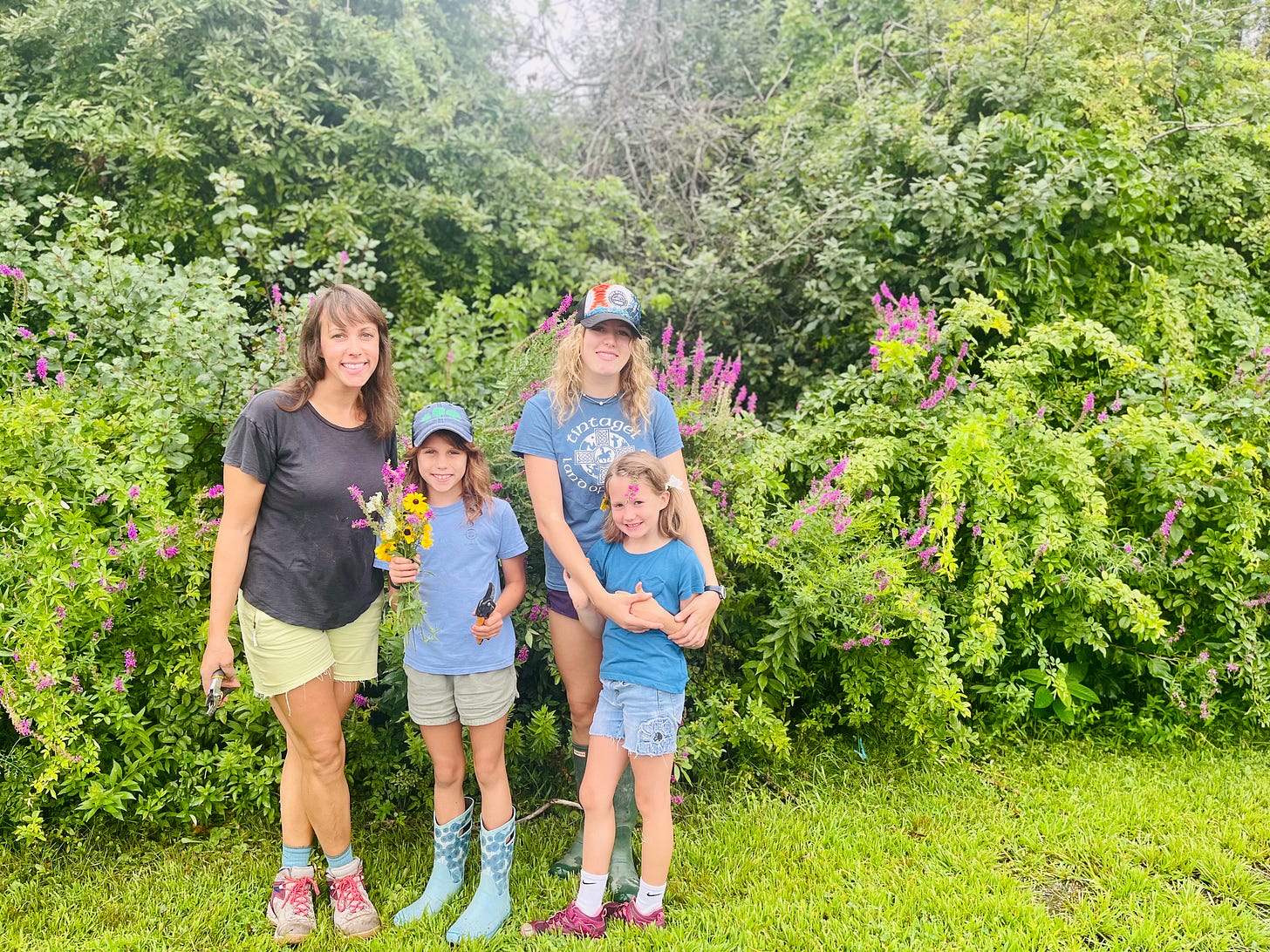These days, when I walk out with a mug of black coffee and a watering can to tend to my potted plants each morning, the first sound that interrupts the leafy stillness is the long, languorous hiss of a cicada. The Japanese were the first to make poetry about that sound but, for all of us, it’s synonymous with summer. That quintessentially August atmosphere of long, deep rain and even deeper sun, of tendrilled vegetation sprawling out of control, of a teeming hum in the background of every moment spent outdoors, can perhaps only be fully appreciated when you’re steeped in its opposite: a crisp, frosted winter morning so quiet that the acid chirp of a lone cardinal sounds close and startling. It’s hard to imagine such cold now, when there’s still so much to be done among the greenery.
Every Friday, our summer volunteers commit themselves to that work, weeding, propping, trimming, tending. We’ve now performed the initial pruning on all but one of our orchard trees—the last one turns out to be defended by a virulent hornet’s nest tunneled between the roots—assuring that they will grow into the signature goblet shape, open and airy and fruit-promoting, that will maximize their ultimate output and longevity. The lovely dun-red cedar fence installed last year around our vegetable garden has proved useful as well as aesthetic: we’ve trellised our enormous butternut squash vines along its length, and the fruit is already starting to swell underneath. Tomatoes are bumping along, ripening every day by the dozen, and herbs like basil and oregano thrive flagrantly in the heat.
This past Friday was a wet, hurricane-bothered morning of sudden showers and sodden vetch, but our volunteers stuck it out admirably, ridding us of a good many weeds and pests, adding a barrow-load of unwanted greenery to the compost heap, and heading home with one of the year’s best harvests: armfuls of tomatoes, chives, summer squash, eggplant, and green bell peppers, the first we’ve ever successfully grown. As we rummaged around and took stock of everything, we noticed a large hole, as wide across as a soccer ball, dug into the ground near the zucchini. I have fears it’s a groundhog taking up residence, in which case we may very well be robbed of all our tomatoes in a single night. But we’ll keep an eye out and hope it’s nothing but a family of rabbits, still annoying but not nearly as destructive. Forming a background to all our work was the rumpling wall of loosestrife across the road, a lurid, alien purple against the general green. We’ll be removing some of that invasive though lovely plant as we reclaim our local pond this autumn, but for now we finished our time by gathering some of its flowers for impromptu bouquets. We were soaked, filthy, sore, and happy.
The more I spend time in our little garden, the more I see it as an end rather than a means. It’s the occasion and the locus for endless worthy things, a place of passage and transformation. If our theoretical groundhog consumes it all before September, we will have lost little more than a few seasonal snacks. The taproot of goodness will be undisturbed. If you’re an educator or a parent or anyone else who’s considering creating such a space, take encouragement that even your failures will only really be setbacks. The actual harvest is inedible. It isn’t even physical. It’s a rhythmic awareness, a give-and-take of compensation that repays us below the level of the stomach or the intellect, ramifying in the heart. There are many ways to reap this sort of harvest. Prayer is one, poetry another. But a garden will do.
If you like what you’re reading here, please consider referring a friend.







Is the basil flagrant or fragrant? Or both?! And really love all this, so inspiring as I survey my own overrun beds. I have too many volunteers this time of year, and not enough 😉.
Finding CRS in my inbox is always a welcomed surprise.